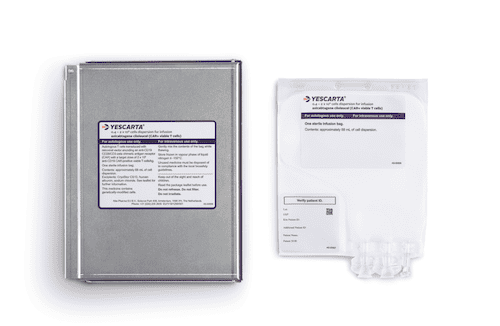
NICE has today approved Novartis’ CAR-T therapy Kymriah for adults with diffuse large B-cell lymphoma (DLBCL), an aggressive form of blood cancer.
The treatment has a list price of 282,000 per patient, but the company has agreed a confidential deal with NHS England which now puts its CAR-T on equal terms with its rival, Gilead’s Yescarta, in the key DLBCL market.
Gilead secured its deal with NICE and NHS England in October, a small head start it will try to exploit as the two companies look to serve the small number of around 200 eligible patients.
The cell therapy will be made available via the Cancer Drugs Fund (CDF), a programme that allows patients earlier access to treatments while further evidence is collected to address clinical uncertainty, the same route agreed for Yescarta.
“Today’s positive announcement regarding access to Kymriah treatment in England was secured as a result of our close working collaboration with NICE and NHS England, with all parties showing flexibility,” said Mari Scheiffele (pictured below), General Manager of Novartis Oncology UK & Ireland.

The agreement is the second for Kymriah in England. Last year NICE approved its use in children and young adults with Acute Lymphoblastic Leukaemia (ALL), with NHS England heralding its market access clearance as one of the earliest in Europe.
Meindert Boysen, director of the Centre for Health Technology Evaluation at NICE said: “Recommending another revolutionary CAR T-cell therapy for adults with lymphoma represents a step forward for personalised medicine. We are pleased that patients are set to benefit from such an innovative therapy so rapidly because of joint working between NICE, NHS England and the company.
Boysen adds: “CAR T-cell therapy is expensive, however the treatment is specific to each individual and could be a potential cure for some, although it is early days. Our recommendation for tisagenlecleucel on the Cancer Drugs Fund means people can benefit while more data is collected.”
CAR-Ts involve taking white blood cells from the patient, which are then engineered in a lab so they can identify and attack cancel cells, which are then infused back into the patient.
It’s a costly process, but patients only need one course of treatment, and many patients experience a complete remission (CR). Novartis has already been working with specialist sites across England selected to deliver CAR-T therapy for DLCBCL to ensure that they are fully trained and ready to deliver Kymriah.
John Stewart, Director of Specialised Commissioning at NHS England said: “The NHS has agreed another deal with Novartis which means that from next week more patients will benefit from this game changing treatment at even more hospitals throughout the country.
“Providing the latest cutting edge treatments for patients through competitive drug deals and offering more personalised medicines like CAR T-cell therapy are just two of the ways that the NHS Long Term Plan will transform cancer care across the country.”

Worldwide, Gilead has opened up a lead on Novartis, which confirmed last year that it was struggling with limited manufacturing capacity to produce the synthetic T cells.
That means Kymriah will have a lot of growing to do before it reaches blockbuster revenues, which Novartis said was achievable this week at its Q4 results. The company confirmed that the CAR-T therapy only achieved $76m in revenues in 2018, far behind the $183m Yescarta earned in the first nine months of last year.




